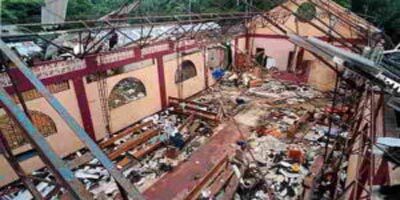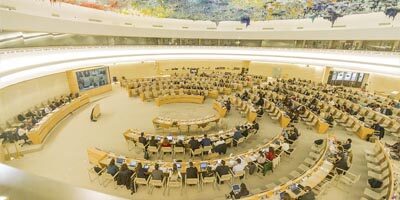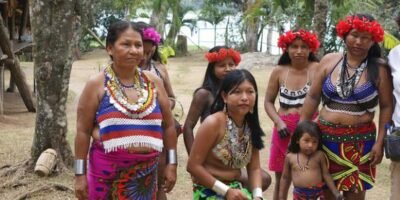
Bushman mother and child
Photo: Survival International
The lives of the Bushmen of Botswana changed dramatically thirty years ago with the discovery of more than three billion dollars’ worth of diamonds in the Kalahari Desert. Their home, now part of the Kalahari Reserve, is in the middle of the richest diamond producing area in the world.
Authorities began relocating the Bushmen into settlements outside the Central Kalahari, arguing that the Bushmen were depleting the reserve’s natural resources, that their lifestyle was no longer consistent with the developmental objectives of the reserve, and that it was cost-inefficient for the government to provide services to the community.
The government said that these relocations were voluntary and occurred only after consultations and public meetings. However, when UN Special Rapporteur James Anaya investigated the situation he concluded that the experiences of the Bushmen show otherwise. In practice, he says, people were virtually forced out of their land by government authorities in three clearances.
This is also the view of Jumanda Gakelebone, a Bushman activist and member of the grass-roots advocacy organization First People of the Kalahari.
When I reached him by telephone in Botswana, he described the lack of options his people were given. “If you come and tell people that they have to move, you’re not giving them an option. You’re telling them where you want them to go. The Bushmen of the Central Kalahari were given a certain period to move. And the trucks started coming and loading them out of the reserve. Authorities were not going to give them services unless they moved to the resettlement camps. They were pushed. They were forced.”
According to Anaya and Gakelebone, the government stopped providing food rations, health services and schooling. People were trucked away, their homes dismantled and their livestock confiscated. The government forbade them to hunt in the reserve without a license, but then did not issue any.
Most importantly, the government capped the Mothomelo borehole, which provided the Bushmen with water, and removed the borehole’s pump.
Two hundred and thirty-nine Bushmen joined in taking the government to court in 2002. Four years later they won the right to return, but little actually changed. Although the court ruling allowed the Bushmen to return home, only those named as plaintiffs in the court case were allowed back. The government said that the ruling did not compel it to allow access to water, and kept the hunting restrictions in place.

Bushman woman in the Kalahari Game Reserve grinding melon seeds for soup.
The Bushmen are the indigenous people of Southern Africa. Having once occupied the whole region, just 100,000 remain today in Botswana, Namibia, South Africa and Angola.
The Central Kalahari Game Reserve in Botswana was established by the government in 1961 “to protect wildlife resources and reserve sufficient land for traditional use by hunter-gatherer communities of the Central Kalahari.” It is the traditional territory of 5,000 Gana, Gwi and Tsila Bushmen (and their neighbours the Bakgalagadi). Photo: Survival International.
Without access to food and water in their reserve, many of the Bushmen stay in resettlement camps. Those that try to live in the reserve depend on erratic rains, melons, roots, and rain-filled depressions in the sand that they call “pans” for water.
Getting water can mean a journey by foot of about forty kilometers to the nearest source. In the dry season, water-supplying vegetation and pans are scarce, and the Bushmen risk death by starvation and thirst.
For those in resettlement camps, where the government provides daily subsistence, life is not significantly better. Survival International, a UK organization that advocates for tribal peoples’ rights worldwide, says that an overwhelming number of Bushmen would rather go back to their land.
“The people in resettlement camps are depressed. They’re bored. They turn to alcohol. In the camps they live on handouts from the government. They just sit there every day waiting for food,” Survival International spokesperson Fiona Watson said. “Putting these people in resettlement camps destroys them. Imagine what that does to their pride and sense of dignity and self worth. The government justifies its conduct by saying that it is trying to bring development to the Bushmen. This sort of development is appalling.”
“The government can’t make them like depending on handouts,” Gakelebone said. “They are used to living by themselves. That’s why they like being in the reserve. Because they can go hunting, they can find food themselves, they can feed their families.”
In the eyes of the Bushmen, two companies in particular – Gem Diamonds and Wildlife Safaris – are intruders in their land, running operations for which Bushmen did not give their approval, and they were not informed about the impacts of these economic projects on their lives.
Gem Diamonds
The Bushmen’s situation grew more uncertain at the beginning of 2011, when Botswana’s government green-lighted the exploitation of the reserve’s Gope Deposit by the British company Gem Diamonds.
Gem Diamonds claims it secured the consent of the Bushmen on whose lands the mine will be located. However, Survival International questions the level of transparency of these consultations, saying that the Bushmen were not given advice on what the likely impact of the mine would be, and many were living outside the reserve when the consultation was made.
“Many of the Bushmen who have the right to live in the central Kalahari Game Reserve had not exercised that right because of the problem of not having any water,” Watson said. “These people could not be expected to sit down and negotiate with the company about developments on their land, given their position of weakness.”
At the end of 2011, Gem re-opened the Mothomelo borehole, allowing access to water for the first time in nine years, and promised to provide another three boreholes.
Wildlife Safaris
The government also recently allowed Wildlife Safaris to open a tourist camp and a luxury lodge – with a swimming pool – in the north of the territory. Wilderness Safaris’ position is that since the Central Kalahari Game Reserve is state land, the government has the right to decide what to do with it. However, according to Watson, neglecting to consult the Bushmen on whose lands the camp sits and whose lives would be affected de-legitimizes Wilderness Safaris’ lease with the government.

Wilderness Safaris points out that water used for its swimming pool is unfit for consumption and is salty, and that the government does not allow it to provide the Bushmen with water from the boreholes. As for the lack of consultation with local people, it says that this has never been the practice for any commercial operators in the area, and that its dealings are with the government.
James Anaya says that the government’s decision to allow large economic projects exploit the reserve contradicts its stated concern with the Bushmen’s non-conservationist treatment of the land.
“It is permitting an operation that is planned to last several decades and could involve an influx of 500-1200 people,” he said. This has fueled suspicion about the real intensions of the government and its bias in favor of its “commercial protégées.”
2011 court victory
In January, 2011, Botswana’s court of appeal ruled in favor of the Bushmen, declaring that they have the right to use the Mothomelo borehole and to dig new boreholes as needed.
Press Secretary to the President Jeff Ramsay refused to comment for this article, but referred me to a press statement. “The Botswana Government wishes to reiterate its commitment to improving the quality of life for all its citizens, as reflected in our well known policies that have been recognized internationally,” it said. “While we do not agree with certain aspects of the basis on which the decision was reached, we recognize that this is a decision of Botswana’s highest court from which there is no appeal. The Government of Botswana will, in line with its established policy of respect for the decisions of the Courts and the rule of law, facilitate implementation of the decision of the Court as reflected in the order.”
Survival International is concerned about whether access to the Mothomelo borehole will be enough to allow the Bushmen to live as they did prior to their eviction. The court ruling did not touch on the right to hunt, or on the 2006 ruling that the government had the duty to provide the Bushmen with hunting licenses.
“Many of the Bushmen are very angry. They say these developments are happening on their land without them giving their consent. This is the moment for the government to just let them go. This is a chance not only to honor the 2010 ruling but also the 2006 ruling, with the intent of truly giving the Bushmen the possibility to live well on their land.”





